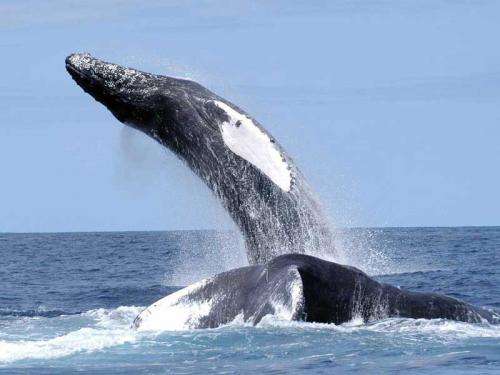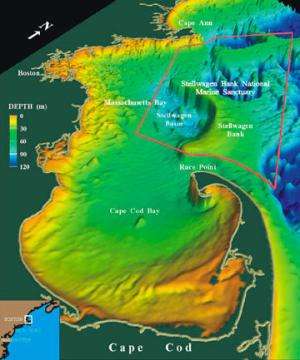Researchers track singing humpback whales on a Northwest Atlantic feeding ground

Male humpback whales sing complex songs in tropical waters during the winter breeding season, but they also sing at higher latitudes at other times of the year. NOAA researchers have provided the first detailed description linking humpback whale movements to acoustic behavior on a feeding ground in the Northwest Atlantic.
Findings from the study, published April 10 in the journal PLOS ONE, demonstrate the potential applications of passive acoustic tracking and monitoring for marine mammal conservation and management.
Co-author Sofie Van Parijs, who heads the passive acoustics group at the Woods Hole Laboratory of NOAA's Northeast Fisheries Science Center (NEFSC), says this study is not so much about biology, but about acoustic methods.
"We have monitored and acoustically recorded whale sounds for years, and are now able to 'mine' these data using new computer software applications and methods, " said Van Parijs. "Passive acoustic tracking has enabled us to localize humpback whale song to study the movements of individual whales, and to relate the singing to specific behaviors. This has never before been accomplished for singing humpbacks on a northwest Atlantic feeding ground."
"Passive acoustic tracking of humpback whales and other cetacean species provides an opportunity to collect data on movement patterns that are difficult―or impossible―to obtain using other techniques," said lead author Joy Stanistreet, who worked with Van Parjis and co-author Denise Risch at the NEFSC's Woods Hole Laboratory at the time of the study. Stanistreet is currently a graduate student at the Duke University Marine Laboratory in Beaufort, N.C.

Since 2007, NEFSC researchers have used year-round passive acoustic monitoring to study ocean noise in the Stellwagen Bank National Marine Sanctuary, a feeding ground for humpback whales and other marine mammal species in the southern Gulf of Maine. Humpback whales typically frequent the sanctuary between April and December and feed on sand lance and other small schooling fish. Humpback whale singing in the sanctuary usually occurs from April through May, following the spring migration from southern waters, and from August to December before the return fall migration. During the summer, humpbacks remain in the sanctuary but generally do not sing while they feed.
The researchers used data from acoustic recordings collected from an array of 10 bottom-mounted marine autonomous recording units (MARUs). Continuous 24-hour recordings units were deployed in the sanctuary for four consecutive three-month periods during 2009. The MARUs were placed three to six miles apart, and the arrays shifted seasonally to areas within the sanctuary having high whale concentrations.
Humpback whale songs were recorded in distinct time periods during spring and fall. No songs were recorded during summer and winter, although humpback whales remained in the area. Songs were most common in the spring, and occurrences of singing increased significantly before and after migration periods.
Forty-three song sessions, each lasting from 30 minutes to eight hours, were used to track individual singing whales. Most of the singers were actively swimming; the patterns and rates of their movement ranged from slow meandering to a faster directional movement. In one case, two singers were tracked at the same time, suggesting a potential reaction by one singer to the presence of the other.
Marine mammal researchers could also use passive acoustic localization and tracking methods to better understand the geographic distribution, abundance, and densities of cetacean species, many of which are threatened by human activities. These applications may help inform and enhance marine mammal conservation and management efforts
Journal information: PLoS ONE
Provided by NOAA Headquarters




















